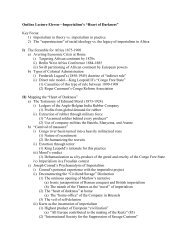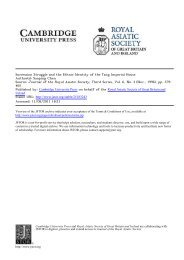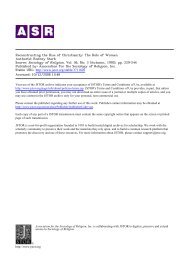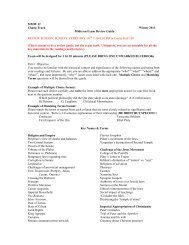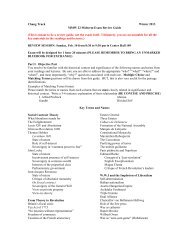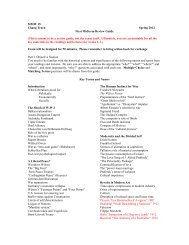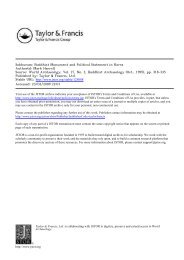Sample Prospectus
Sample Prospectus
Sample Prospectus
Create successful ePaper yourself
Turn your PDF publications into a flip-book with our unique Google optimized e-Paper software.
TITLE OF PAPER USING FEWER THAN 50 CHARACTERS 5<br />
[Rebuttals] Despite these arguments, I argue that Talleyrand successfully used the<br />
platform of European balance of power to advance French political interests. Talleyrand<br />
effectively argued against the Austrian acquisition of Sardinia by raising the specter of Austrian<br />
dominance of northern Italy (Blinn, 1935, p. 144). When Talleyrand maneuvered France into the<br />
Triple Alliance with Britain and Austria to counteract growing Russian influence, he did so in<br />
order to decrease border friction and turn bitter enemies into allies who would support France's<br />
international agenda (Ferrero, 1941, p. 275). While France had fought Britain and Austria on and<br />
off for nearly 200 years prior to the formation of the Triple Alliance, France has not since been<br />
involved in a major conflict with either country. Furthermore, Talleyrand used his adept<br />
diplomatic skills to keep the defeated France at the negotiating table by insinuating that only<br />
France would be capable of forcing Tsar Alexander to give up his 1813 alliance with Prussia and<br />
enter into a broader European balance of power (Chapman, 1998, pp. 18-19). In order to prevent<br />
a future conqueror (à la Napoleon) from destabilizing this new system, Talleyrand used his<br />
influence to delegitimize the “right to sovereignty by force” within the Congress and ensure that<br />
the other powers would not tolerate aggressive or illegitimate conquests (Dwyer, 2002, p. 146).<br />
[Conclusion/Explanation of Significance] Despite Napoleon's defeat, Talleyrand<br />
ensured that France would continue to have a voice in European affairs through his collective<br />
security scheme. He maintained that this system was in France's long-term interests and spurned<br />
warfare as an effective political tactic. Talleyrand argued that war inflicted nearly as much<br />
damage on the conqueror as on the conquered. Even if Napoleon had been victorious, he would<br />
have left Europe in a perpetually unstable condition with the threat of war ever-looming.<br />
Talleyrand firmly believed that an unstable Europe was ultimately incompatible with a strong



